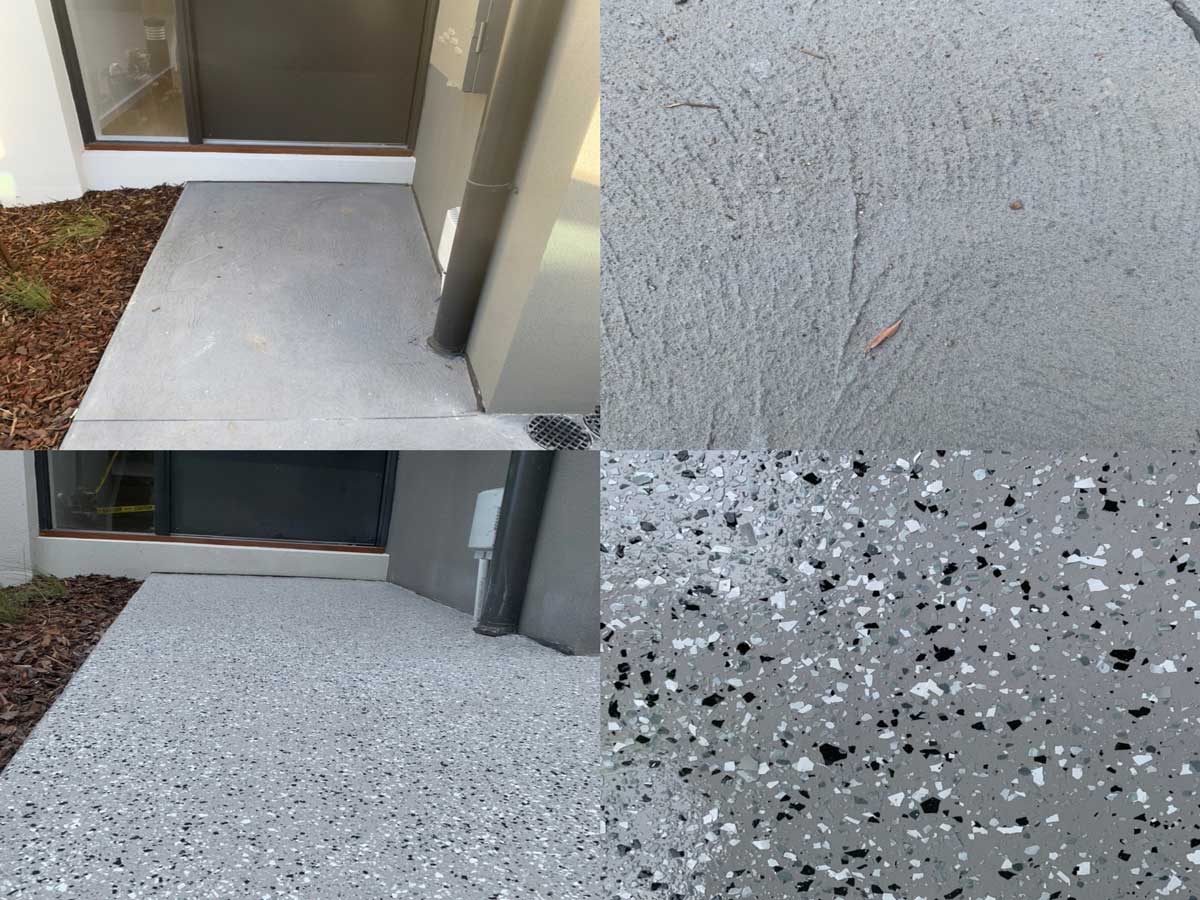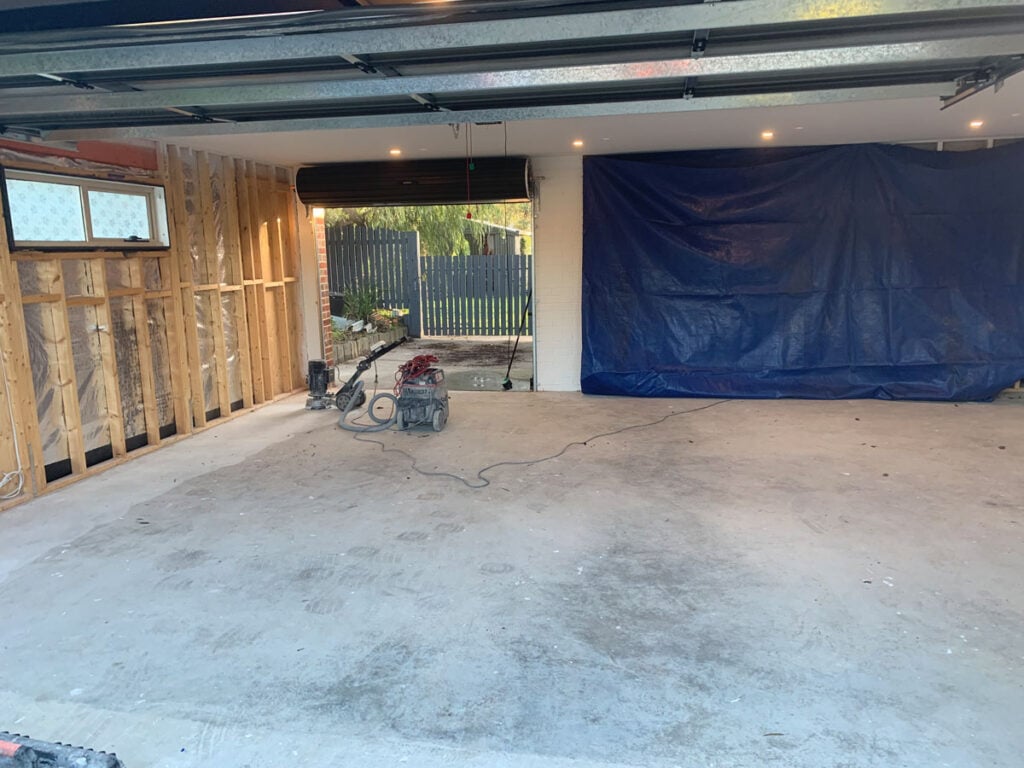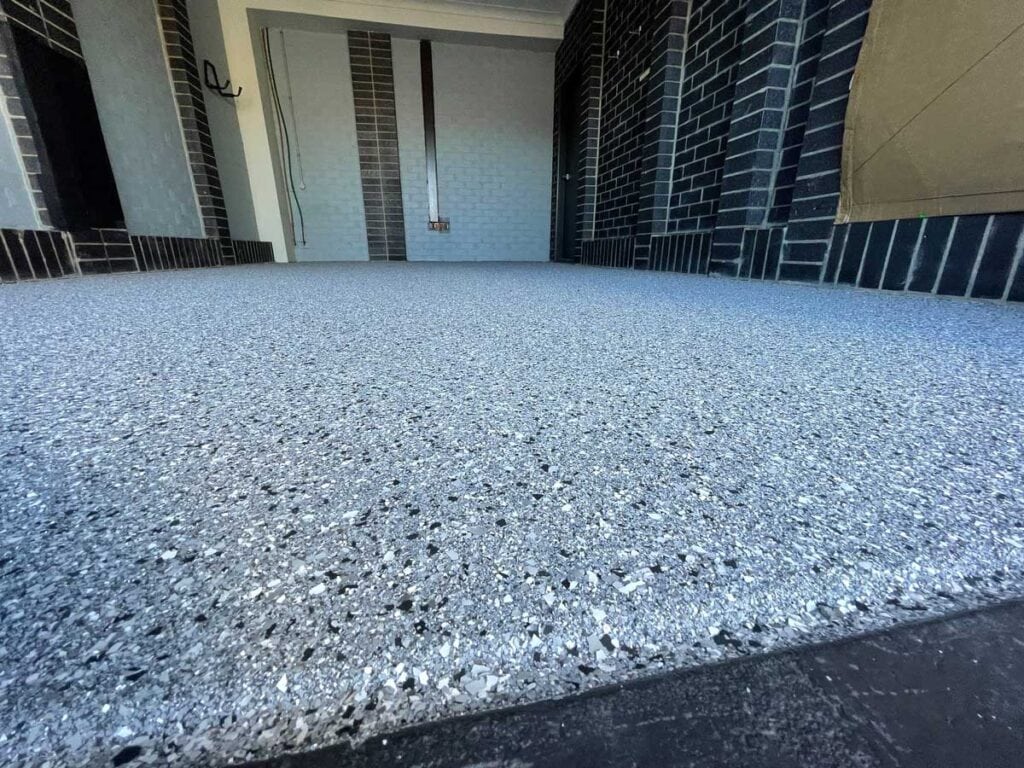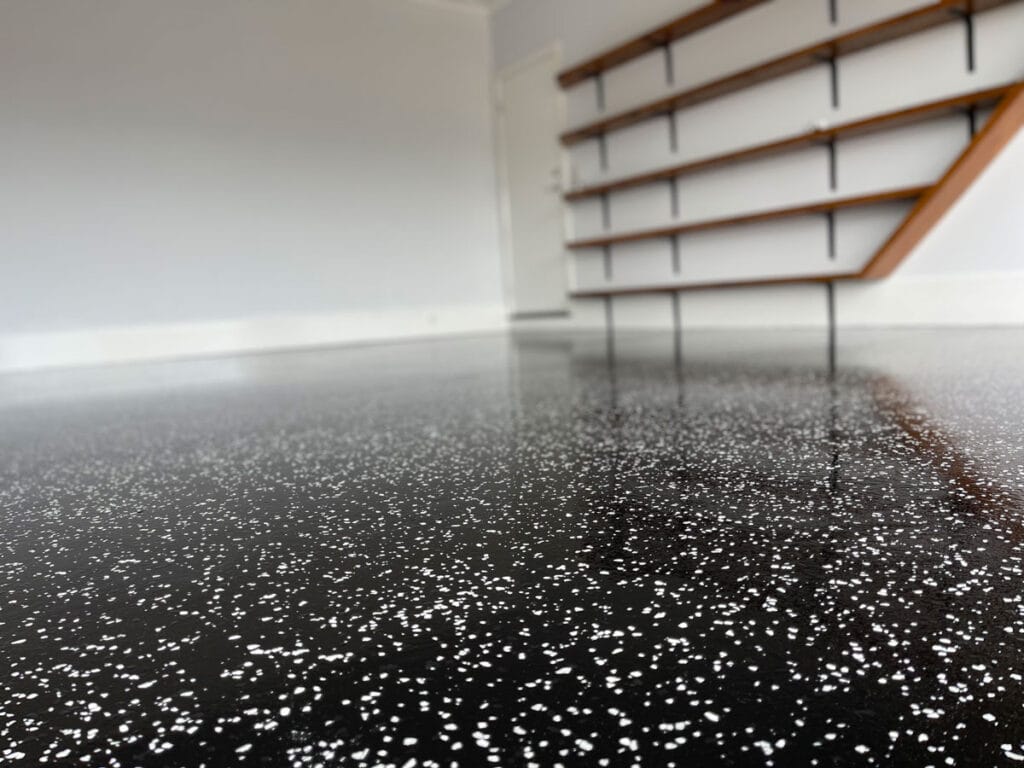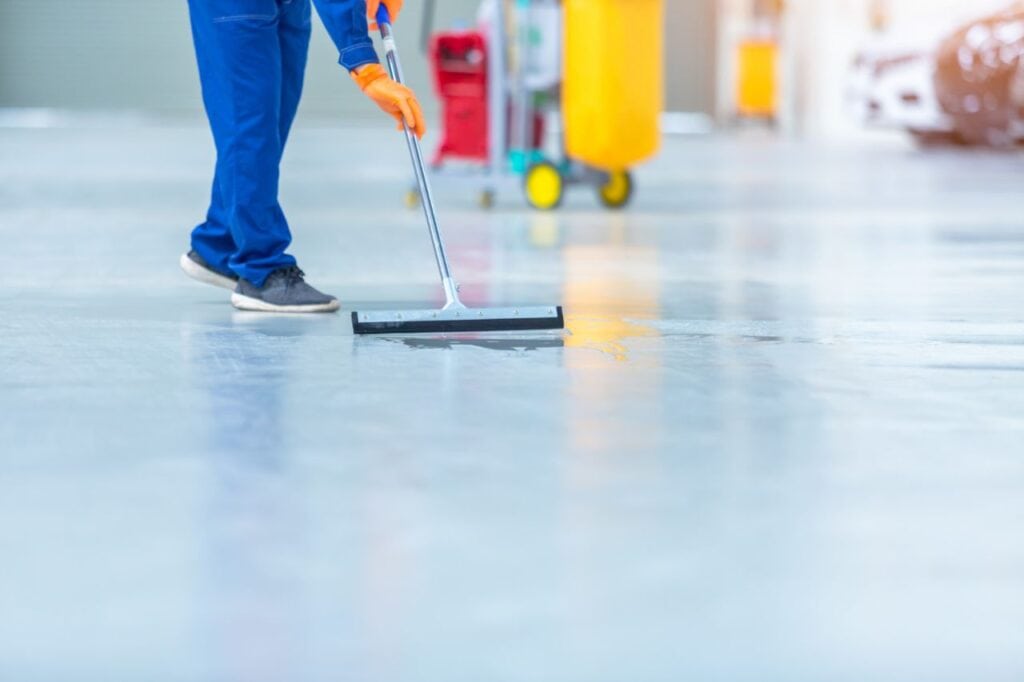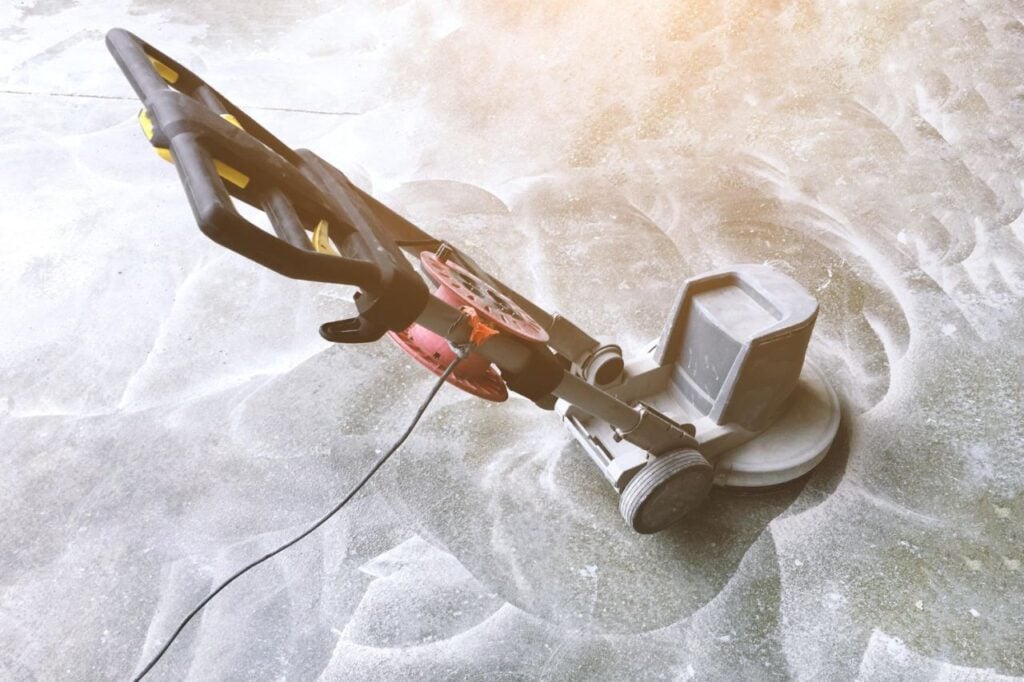Epoxy flooring pros and cons. Because epoxy flooring is so tough, the sound of footsteps may be heard as you walk across them. Additionally, it emits chemical fumes throughout the installation process, frequently becomes a yellowish color with use, and can be hazardous to walk on when wet. When an aggregate is applied to epoxy flooring, however, it is transformed into a surface that is non-slip. Because of this, it is a great choice for locations that are prone to becoming wet, such as food processing industries, bakeries, dairies, abattoirs, and breweries.
Epoxy floors have a few drawbacks to consider. Not having underfloor heating makes it feel a little bit colder. Nevertheless, in order to make the floor less slippery, you can give it some texture by using products that are add-ins. Epoxy flooring is a short-term remedy for flooring problems.
Epoxy flooring is a well-liked option for use in industrial settings, but it does come with a few drawbacks. Epoxy floors provide the most durable finish, however, epoxy finishes are not permanent. An impermanent coating can be applied to epoxy floors. For this reason, flexible polyurethane flooring is typically used in residential and commercial settings such as offices. The drawback of using epoxy for the flooring. When factoring in the cost of both the material and the labor, the cost of epoxy flooring can range anywhere from 120 to 550 square feet per square foot.
Epoxy flooring continues to offer one of the most significant and immediately noticeable advantages in terms of pricing. Epoxy flooring does not stick to dirty surfaces, and if the surface were cleaned first, the installation could not be as smooth or as correct as it could have been.
As opposed to more conventional coatings, which are typically put over concrete, epoxy floor coatings have numerous benefits for their users. Epoxy floors are hard, and as a result, there is contact noise when walking on them while wearing shoes such as high heels for instance. One of the most significant drawbacks of employing epoxy as a flooring solution on your floors is that it is only a temporary measure. Floors and buildings adorned with this material have a remarkable effect.
The epoxy coating that is still wet can produce extremely potent fumes. Epoxy flooring has a number of benefits. Because it is immune to microorganisms and germs, it is simple to clean and maintain its sterility. When wet, the surface is very slippery. Everyone appreciates a floor that is not just gleaming and flawlessly smooth, but also one that is simple to keep clean.
Despite the fact that it is hardy and resilient, you will ultimately have to replace it. You are going to need to apply a new coat of epoxy if you want things to continue to appear nice. When the epoxy has been applied, deeper hues of the substance have a greater propensity to smell more strongly of ammonia. Epoxy takes a very long time to completely set after being applied.
To What Extent Is It Challenging to Remove Epoxy Flooring? Maintains its beauty for a longer period of time than most other flooring options. A floor coated in epoxy is risk-free. Epoxy floors offer exceptional resistance to virtually any and all conditions. Epoxy floors, in contrast to several other flooring alternatives, are susceptible to damage from normal day-to-day use and deterioration. There may be differences in price depending on factors such as quality, quantity, and location. One component is Epoxy. 10 Disadvantages of Epoxy Flooring. In the absence of underfloor heating, an epoxy floor might have a comparable chilly sensation to that of a tile floor.
The floors are seamless and liquid-tight, so they are easy to maintain. Disadvantages of Epoxy Floor. Epoxy floors can be Customised.
From chemicals to heat and water. Does epoxy floor Installation require a lot of preparation? It is one of the significant disadvantages of epoxy flooring. One of the significant disadvantages of this flooring is it is temporary flooring. Even though it is durable and chemical resistant, we have to replace it ultimately.
But despite the benefits of epoxy flooring, there are a few disadvantages to consider. An epoxy floor feels somewhat cold without underfloor heating, similar to tiled floors. Due to its cold clinical aesthetic, it is not a popular choice. However, this is a great option for a garage or a hospital. It can last for years without cracking or peeling off when installed correctly.
It results in a do-it-yourself project that is extremely untidy, time-consuming, and difficult. Even seasoned do-it-yourself veterans frequently avoid undertaking this as a private project and instead opt to engage an excellent epoxy floor business to do the installation. In addition to this, they are immune to bacteria and germs. Since it has a higher density, it is more resistant to deterioration than other types of flooring, providing it the preferable option.
As a result, you might have to perform the entire installation process once more. In a space that has a chance of having liquids or water spilled on the floor, an epoxy floor is not the best option to go with. When wet, epoxy floor coatings have the potential to be quite hazardous.
The fact that epoxy flooring is so difficult to put down is the material's sole drawback. Cracks and chips in locations that get a lot of impacts. Produces a highly reflective and glossy surface that, when applied to interior spaces, has the potential to greatly boost the amount of available light. Provides a surface that is wear-resistant, long-lasting, and able to handle heavy and continuous use. Epoxy Flooring comes in a variety of colors. It is really clean and sanitary. The cleanliness of an epoxy floor cannot be beaten. Simple to keep clean and maintain in good condition. Disadvantages: Don't try to drown out the sound. It does not attract much, and it is simple to sweep and clean up after.
Advantages And Disadvantages Of Epoxy Floor
Floors in commercial and industrial settings frequently have coatings made of epoxy applied to them. Epoxy coatings are typically sprayed directly on top of concrete floors in order to create a surface that is greater, smooth, and long-lasting. This surface should be able to bear large loads for a number of years.
Epoxy floors are essential to the cleanliness and safety of working environments found in a significant number of commercial and industrial facilities, including warehouses and distribution centers.
Epoxy floor coating may completely remodel your area while also reinforcing your flooring, making it a great option whether you want to seal your concrete surface or update your old flooring. This floor coating has a surprising number of beneficial applications, including the preservation of concrete surfaces, protection against severe impacts, and the presentation of a glossy finish.
There are a number of advantages to coating the floor of a room, auto shop, or garage. Any area that sees a lot of foot traffic would benefit from having a floor coating made of epoxy because it is durable and also seals the surface. Epoxy can also insulate your floor from any additional damage and bring a level of expert refinement that it may be lacking if the floor is uncoated and has been left open to harm. This is especially useful if the floor has been left exposed to damage.
Advantages Epoxy Floor
- Epoxy flooring is impervious to the effects of a wide variety of substances, including acids and solvents.
- The flooring is designed to look beautiful. Epoxy flooring can be purchased in a wide variety of hues and patterns to suit your needs. You have the option of giving the floor the appearance of concrete or of sprinkling it with flakes;
- So because applications can be completed so quickly, there is just a little amount of downtime;
- Floors that are made of epoxy are incredibly simple to clean and maintain. When everything is said and done, the flooring is smooth and liquid-tight, making them easy to clean and contributing to improved hygiene;
- The use of epoxy flooring and underfloor heating is a successful combination. Very environmentally friendly. When combined with underfloor heating, one not only reduces its energy consumption but also eliminates the need for radiators, which results in an increase in available space. The floor does not have any seams or edges, and it fits in perfectly with the rest of the room.
- Robust. Because of this, epoxy floors are appropriate for high use and mechanical loads, such as forklift traffic, which makes them ideal for use in production facilities, workshops, and warehouses.
Disadvantages Epoxy Floor
- Because epoxy flooring is so tough, the sound of footsteps may be heard as you walk across them. For this reason, flexible polyurethane flooring is typically used in residential and commercial settings such as offices.
- A cold sensation, comparable to that of tile floors, can be experienced on an epoxy floor in the absence of underfloor heating.
- On the floor, ripples may appear if the foundation has imperfections such as cracks or unevennesses. This only occurs if the epoxy floor is unable to bridge the pre-existing fissures in the floor. A bond is formed between the floor and the substrate. Epoxy flooring should only be applied on a surface that is completely smooth for this reason. In the event that the surface is not even, you will initially need to restore it. The unevenness in concrete surfaces can be remedied using the thixotropic paste that he possesses, which is composed of epoxy resin and lightweight fillers.
- Because it lacks a finish, the floor is susceptible to damage from UV rays. To our relief, the UV protection may quickly and inexpensively be increased by applying one or two coatings of an HIM finish coat.
What Is Epoxy Floor Coating?
The components of epoxy floor coating are epoxide resin, polyamine hardener, and several other additives. It is frequently utilized as an adhesive when it is not being put to use as a floor coating. As it is combined, a chemical reaction takes place, which endows your floor with particular characteristics. This chemical reaction is responsible for producing effective options and durability on the surface, which is one of the most significant properties.
Additionally, the surface to which this technique is applied is sealed and cured, which results in the formation of a strong bond. Examining the positive aspects of epoxy floor coatings can help you decide whether or not this material is the best option for your area.
Appearance And Covering Defects
Epoxy floor coverings may transform places that are unfinished and untidy into areas that are clean and completed. An epoxy coating will provide a sophisticated appearance in a garage, whether that garage is part of your commercial operation or is located in your personal residence and needs some tidying up. The reflecting quality of the material is compatible with any decorative illumination that you may already have. Epoxy will give the room a different dimension as light reflects off of it and moves around.
Moreover, epoxy has the ability to cover any injury that may already be present on your hard surface from previous incidents. Epoxy is available in a wide variety of patterns and colors, giving you a lot of design and color possibilities to choose from when decorating a room or garage. Choosing epoxy paint, which incorporates the long-lasting ingredient into the paint color of your choice to create a masking effect, is one way to disguise defects even more fully.
It is possible to give the epoxy mixture a speckled appearance by adding decorative chips of mica or quartz, which also improves the material's grip. This design incorporates supplementary elements that sparkle when they are illuminated because they are designed to capture the light. In addition, to all of these exciting options, silver epoxy resins may also be used in order to improve the refined surroundings. With an epoxy floor coating, you can give functional spaces a more elegant appearance without affecting their functionality.
Cost-Effective
When compared with the expense of removing the existing flooring, purchasing new tile or vinyl, and paying additional construction fees, epoxy is a more cost-effective solution.
It will not be necessary for you to remove the flooring substance that is currently in place, which will save you both time and money. If you go with an epoxy finish, sprucing up your flooring doesn't have to include laborious and time-consuming treatments that cost a ton of money. By keeping the floor you already have, not only will you save money on the cost of installation, but it will also seem sleeker and brighter.
Epoxy is a simple and valuable alternative for an industrial-style setting that can be used in the event that your concrete floor is not providing the look and benefits that you would want. Even though installing epoxy flooring requires several coatings, with drying time in between each one, the overall time and financial investment are significantly less than what it would be to put an alternative type of flooring.
If any flaws appear in the product, prompt attention opens up the possibility of more cost-effective repairs. Due to the amount of time that the flooring remains intact, opting for professional installation is a practical choice. This will make the money spent on professional installation worthwhile.
It will be the most financially prudent choice to delegate the completion of this process to professionals. Professionals have the knowledge and experience to steer clear of harmful application procedures and to take the precautions that are required.
Resistance
Make use of a coating surface to shield your garage, basement, and laundry room from possibly dangerous elements that are more prone to enter rooms with a lot of visitors due to their position. Epoxy has a name for being among the most durable alternatives available due to its use as a flooring system. It experiences great heat, pressure, a variety of acids, and moisture. This product is perfect for use in garages because vehicles can produce a diverse range of caustic compounds.
Shock
The adhesive is resistant to the damaging effects of shock, which is one indication of the material's high level of toughness. Effects that would normally cause you concern, such as high proportions tumbling to the ground or the wear and tear caused by vehicles driving on the ground, would not be able to damage the epoxy coating because of its thick and durable nature. Examples of this include the use and tear resulting from automobiles driving on the surface. There will be no sign of anything you drop on the floor, whether it be tools, machinery, or even recreational equipment; you won't be able to find it. Even the most jarring shocks will no longer chip your concrete if you seal the ground with a sufficient coating of epoxy and then seal that layer.
Heat
Once it has reached the dry state, epoxy has the ability to endure temperatures that have been predetermined. Typical adhesives have a temperature tolerance of up to 200 degrees Fahrenheit before they begin to fail, however, epoxy has a substantially higher heat resistance and can withstand temperatures of even higher magnitude. Epoxies that contain phosphorus are able to endure heat better than ones that do not contain it because of the resiliency provided by the element. In order to achieve the best possible levels of resistance, phosphate is added to the mixture in varying amounts. This is done so that the mixture can be optimized. For flooring to be installed in either a kitchen or a basement that is used to store vehicles, the capacity to tolerate extreme temps is a trait that is highly desirable.
Chemical
Epoxy will not be damaged by chemicals that have been left behind in your car or accumulated from doing chores. For instance, if the automobile collection you keep in your garage needs substantial work, and there is oil or brake fluid on the flooring, there is no reason to become anxious about the situation. It is possible to vacuum the cleaning solvents without causing any injury to the composite coating if the spill is contained quickly enough. It is impossible for chemicals to get through to the concrete below because the levels are so thick and dense. This prevents any potentially dangerous residue from being left behind.
Water
Your floor will not become warped as a result of flooding or spills if you use this product that is resistant to water. When water does not soak into the floor, certain areas may be more hazardous to walk on than others depending on the type of epoxy that was used. In the event that water pools on top as a result of how waterproof it is, you may even request slip-resistant aggregate to be put into epoxy flooring in order to provide additional traction.
Long-Lasting
Epoxy will not need to be reapplied for a considerable amount of time after it has been initially installed. Because it is resistant to shock, water, and even stains, the coating will last longer than tile, carpet, and wood flooring combined. Resin is extremely robust and protective, so its looks won't degrade for many years after it has been applied.
Laminate flooring is a sensible choice for preparing garages and basements for long-term satisfaction. If you want to install flooring that you won't have to keep replacing periodically over the years, epoxy is a good alternative to consider. The coating application's cost-effective benefits are further strengthened by the coating's long-term durability.
Protection
Concrete as well as other surface materials can be protected using epoxy, which is a sealer. This formidable shield is placed directly on top of the underlying surface. Because the membrane-like layer of the epoxy attaches to the top of the rough flooring, the concrete that lies beneath the epoxy will maintain its integrity for a longer period of time. In addition to serving as a preservation layer, this prevents the concrete from deteriorating in any way, including cracking or crumbling. As a direct consequence of this, the surface does not absorb stains, which prevents flaws from developing in the concrete. In most cases, more than one coat is applied over the course of a few days, and as a result, the stacking and combining of the epoxy ultimately result in a sheet that is thick and rubbery.
Strength
Epoxy is capable of withstanding not only blows and jolts, but also significant amounts of weight without breaking down. Epoxy is unique among adhesives due to its high tensile strength; nonetheless, even when used as a coating, epoxy continues to be a robust covering. The addition of epoxy to concrete can improve its capacity to support weight, and certain types of epoxy can even boost the surface strength of the concrete from approximately 3,000 pounds per square inch to 10,000 pounds per square inch. Epoxy also has the capacity to prevent it from peeling and tearing, which contributes to the overall strength of the material.
The surface will be robust enough to withstand severe loads as well as normal wear and tear if the epoxy attaches to the concrete in the correct manner and keeps its typical level of stiffness.
Even though it has the appearance of glass or a veneer that is easily damaged, epoxy has the strength of a resin. Epoxy gets its strength from the hardener, which is a component of the epoxy compound that is formed of polyamine. This man-made chemical acts as a corrosion inhibitor, screening it while simultaneously fortifying its composition.
Ease Of Maintenance
Epoxy has a low maintenance requirement, which is another benefit of using it. By covering the concrete, you may reduce the amount of dust and cement particles that are distributed throughout the other objects in your home or garage. In contrast to a standard concrete floor, which is not only gritty but also fragile, the surface of an epoxy floor is easy to sweep and keep in addition to being robust.
Moreover to this, when the primary source of the residual concrete is confined, the amount of dust that is produced is significantly reduced.
The adhesive is unaffected by the salt that accumulates on winter roads, and the buildup can be removed in the same simple manner as any other debris that your vehicle may leave behind. Washing epoxy floor coating is a straightforward process that may be done with a broom, mop, or vacuum, depending on your preference. Epoxy is a durable and hygienic covering since it does not allow pollutants such as bacteria, germs, grime, and other filth to attach to its surface.
In the event that more powerful cleaning tools are required, the surface is resistant to scratching. You should avoid using acidic chemicals to clean epoxy since they have the ability to make the surface less lustrous. The simplest and most effective method of cleaning epoxy is with soap or detergent and water. The water and chemical spills that have been stated before are easily wiped away without leaving a permanent stain on the floor because of the resistant qualities that have already been discussed.
Safety And Visibility
Increasing the visibility in big spaces and garages can be accomplished by applying an epoxy floor covering.
Epoxy provides your space with an additional layer of protection by enhancing the surface's ability to reflect light and so brighten the entire area. The majority of epoxy options have a deep sheen, which results in an attractive appearance. Additionally, the shiny nature of epoxy can help keep you safe by boosting the amount of light that is present in a certain area.
Other factors that contribute to the protection of epoxy include the presence of traction in some varieties of epoxy and anti-slip mixtures. Your epoxy flooring's stability can be improved with the use of certain additives, hence reducing the risk of injury from falls. To provide a variety of different grip effects, which will result in a change to the smooth surface of the epoxy, mortar, polymer grit, gravel, sand, or aluminum oxide can be used. Request an additive from your flooring provider while you are discussing the job with them so that they can assist you with selecting the option that will work best in your area.
If your implementation personnel take the essential precautions and adequately ventilate the area, the epoxy fumes will not be harmful throughout the curing period. This will be the case whether or not the epoxy has been cured. When it has fully hardened, the epoxy floor is completely risk-free for you and your loved ones to walk on. Pay attention to any preventative measures that the experts you employ have set in place. This can involve a momentary increase in the length of the ventilation.
Compatible With Vehicles
Epoxy for garage floors can also meet the requirements for vehicles. Because of its consistent surface, it maintains the optimal condition of both automobiles and the tires on those vehicles. While the roughness of concrete may cause your tires to wear down faster, the smoothness of epoxy will cause your tires to have very little to no reaction. This option will create less wear and tear on your vehicle, which will result in fewer instances of mechanical problems. Because of its capacity to support a substantial amount of weight, epoxy can serve as an effective surface for parking automobiles for either short-term or long-term storage. Because of the increased tensile strength, a concrete surface that has been improved with epoxy will provide superior support for the weight of your vehicle.
The mass of your vehicle alone will cause the concrete to rust with time, which will necessitate the need for therapeutic services. In addition, the requirements of automobile maintenance align with the capabilities of epoxy. Epoxy is resistant to the use of any harsh chemicals or compounds that are associated with the maintenance of automobiles. In the winter, when the weather is cold and the elements are severe, your garage, which has an epoxy floor, is the ideal location for performing car maintenance because it is protected from both. You can perform an oil change in the convenience of your own garage without having to worry about leaving stains or dealing with a significant amount of mess.
Eco-Friendly
Epoxy is an environmentally beneficial solution despite the fact that it is a chemical compound. This is due to the fact that it requires just a small number of resources and does not require constant replacement. When compared to alternative flooring installations, which require saws for cutting tiles or wood as well as other tools, the reduction in the number of essential materials and machinery is beneficial to the environment.
The number of appliances required to install epoxy flooring is significantly lower in comparison to the requirements for installing other types of flooring.
Epoxy floor coating is designed to be durable and endure for a number of years, which reduces the frequency with which considerable amounts of material are required.
The conservation of these resources ensures that they are only utilized when absolutely essential. Epoxy flooring is a great alternative for your room or garage if you are searching for an environmentally friendly flooring option that is also cost-effective, appealing, and durable.
Epoxy Floor Coating Preparation
In order for an epoxy coating to adequately adhere, the surface it is applied on must be clean and slightly porous. On concrete that has been sealed or polished, the epoxy might not attach properly. Additionally, the concrete needs to be completely cured. In order to properly prepare the surface layer for the application of an epoxy floor coating, it is necessary to fill in and restore any major cracks or breaks in the concrete and erase any grease.
Examine the concrete's surface to check for any previous coats of epoxy or other products that may have been placed over the years if the concrete is an older construction. Pour a little bit of water onto the floor and let it sit there to see whether there is any sealant. It ought to sink into your skin. If the water beading up on the edge rather than soaking in indicates that the top has been sealed, then an epoxy coating probably would not work well on it.
Before adding an epoxy coating, check that the heat is appropriate and make sure to follow all of the guidelines provided by the manufacturer. Epoxy can bubble and peel if the temperature is too high or too low. Epoxy is a two-component liquid that needs to be mixed together before use. After the components have been combined, there is a short window of opportunity for applying the epoxy coating before everything begins to set.
Epoxy Primer Formulas
It's possible that you'll need to use a resin primer and finisher coat, but that will depend on the product that's being applied. The primer is applied in the same manner as paint, and then it is given a few hours to dry completely before the epoxy is poured on top. After applying a thin coating of water to the floor in order to apply the priming, proceed to distribute the primer using a roller pin mounted on a pole, making sure to cover the entire floor with the primer and spread it out in a thin layer. After the primer has had a chance to dry, apply a second coat. In the final step, the finisher is applied exactly the same as the primer, but the water layer is not included this time.
Epoxy Floor Coating Advantages
Epoxy coverings provide a number of benefits in comparison to more conventional coatings that are put over concrete, including the following:
- A high-gloss surface is produced, which has the ability to greatly boost the amount of available light in interior spaces.
- Provides a surface that is tough, long-lasting, and capable of withstanding heavy and consistent foot traffic.
- Installation is quick and simple, and it does not require any sort of pattern, extra adhesive cutting, or specialized tools or machinery.
- Long-lasting and simple to maintain
- Perfect for use in storage facilities and other industrial settings
- Protects against water and oil stains.
- Makes for a smooth surface that has the potential to last for many years.
- It is possible to blend it with paints and colors in order to cover up cracks and chips.
- Offers a surface that is resistant to chemicals and is perfect for use in manufacturing operations
- When the surface in question has anti-slip additives, it provides an increased level of safety.
- It can be put in a variety of designs to make driveways visible and to mark areas that are suitable for walking.
- Protects existing concrete floors from deterioration caused by wear and tear
- It is possible for it to be compatible with self-leveling materials that, depending on the product, can be applied over either newly placed or previously placed concrete.
- Requires little to no preventative renovations
FAQs About Epoxy Flooring
Should I Repair Or Replace My Epoxy Flooring?
It is possible that your damaged epoxy flooring would benefit more from being resurfaced rather than being patched in many instances. If the damage is considerable and can be visible throughout a significant portion of the surface, this is the best option. In order to get the area ready for epoxy floor repair, sweep it thoroughly and then use a detergent that is designed to cut through grease to get rid of any oil that is on the ground.
In circumstances where the floor needs to be repaired, removing the coating can be a laborious and time-consuming process due to its vast nature. Using epoxy floors comes with a number of benefits as well as drawbacks. Before making any choice, it is strongly suggested that you talk with an experienced contractor to have your floor evaluated professionally before making any choice.
What Are The Benefits Of Epoxy Floors?
Epoxy floor coverings provide a number of benefits in comparison to more conventional coatings that are put over concrete, including the following: They produce a dazzling, high-gloss surface that, when applied to interior spaces, has the potential to greatly boost the amount of available light. In addition to this, it features a surface that is hard-wearing, resilient, and able to endure high volumes of continuous foot activity.
Epoxy surfaces are famous for their robust finish, which makes them resistant to shock. It helps protect your flooring from any impact, including dropping objects, earthquakes, and even driving over them. When you have epoxy floors installed, you can be assured that your floor will be covered no matter what kind of impact is delivered to it.
Is Epoxy Flooring Hazardous?
After the resin floor has totally hardened, the substance will no longer pose any threats to the user's health. If you sand the flooring after the epoxy has cured and then breathe in the dust that is created, the adhesive could become dangerous. It is quite necessary to select the appropriate material and have it laid in the appropriate manner in order to have a floor that is both attractive and durable.
Does Epoxy Paint Peel Off The Floors?
If the epoxy paint is put on the floors while they are wet, then the paint will peel off of the flooring. Once the material has cured, it will not breathe, therefore any moisture that gets trapped underneath the surface will become a problem when it evaporates. This can be an issue because the substance will not breathe. In certain instances, the flooring material may develop bubbles or buckles as a result of this issue, which may necessitate having it repaired or refinished at some point in the future.
How Do You Use Epoxy Paint On Wood Floors?
To begin, pour epoxy over the center of the wood in a slow and careful manner. Make your way towards the corners of the wood by pulling the epoxy with a foam brush. Make an effort to standardize it as much as you can. Utilizing the same brush, remove any remaining epoxy from the side of the container.
Once the epoxy repair has properly been set as directed, scrub the floor once more to eliminate any last traces of filth and oil, and then buff the floor using a sanding screen with an 80-grit grit rating. Before applying the epoxy paint, you should vacuum and clean the floor to eliminate any dust that may be present.
Typically, epoxy flooring lasts 2 to 3 years in heavy traffic. Commercial properties—like garages, restaurants, or factory spaces—with lots of daily foot traffic can expect this experience. However, with proper care and maintenance, your epoxy flooring may last much longer.
- Strong Application Fumes. During the epoxy application process, wet epoxy gives off an unpleasant smell. ...
- Long Curing Time. ...
- Slippery When Wet. ...
- Economical Flooring Choice. ...
- Resistant to Damage. ...
- Weather-withstanding. ...
- Aesthetically Pleasing. ...
- Protects and Decreases Wear & Tear.
Extremely safe – Epoxy is a very safe coating for your hard floors. It's slip resistant, shock resistant, and less abrasive than concrete and other types of industrial flooring. ... It can also withstand heat of up to 200 degrees, making it a better choice than most other types of flooring when it comes to fire resistance.


